Unit 2 What time do you go to school?——2022-2023学年人教版英语七年级下学期期末复习学案(含解析)
文档属性
| 名称 | Unit 2 What time do you go to school?——2022-2023学年人教版英语七年级下学期期末复习学案(含解析) | 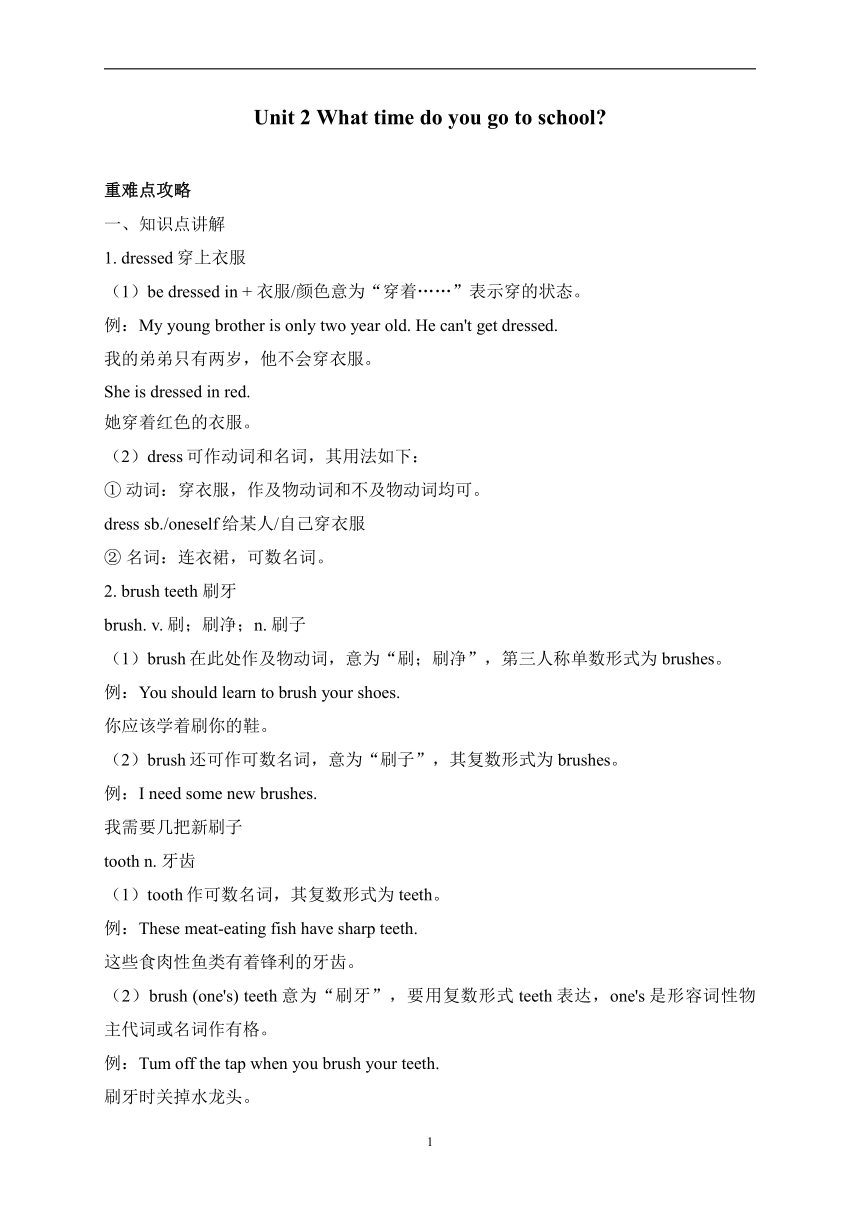 | |
| 格式 | docx | ||
| 文件大小 | 32.8KB | ||
| 资源类型 | 教案 | ||
| 版本资源 | 人教新目标(Go for it)版 | ||
| 科目 | 英语 | ||
| 更新时间 | 2023-06-18 15:06:12 | ||
图片预览

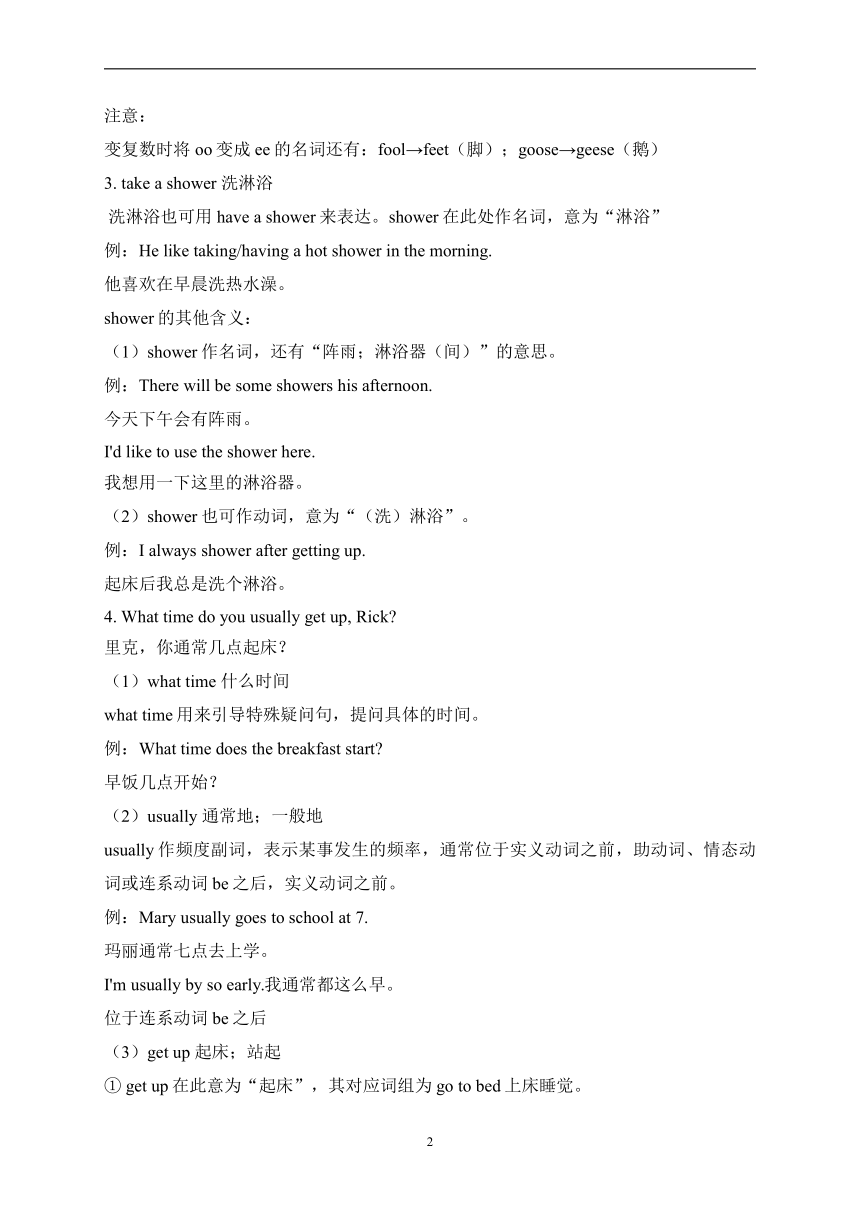
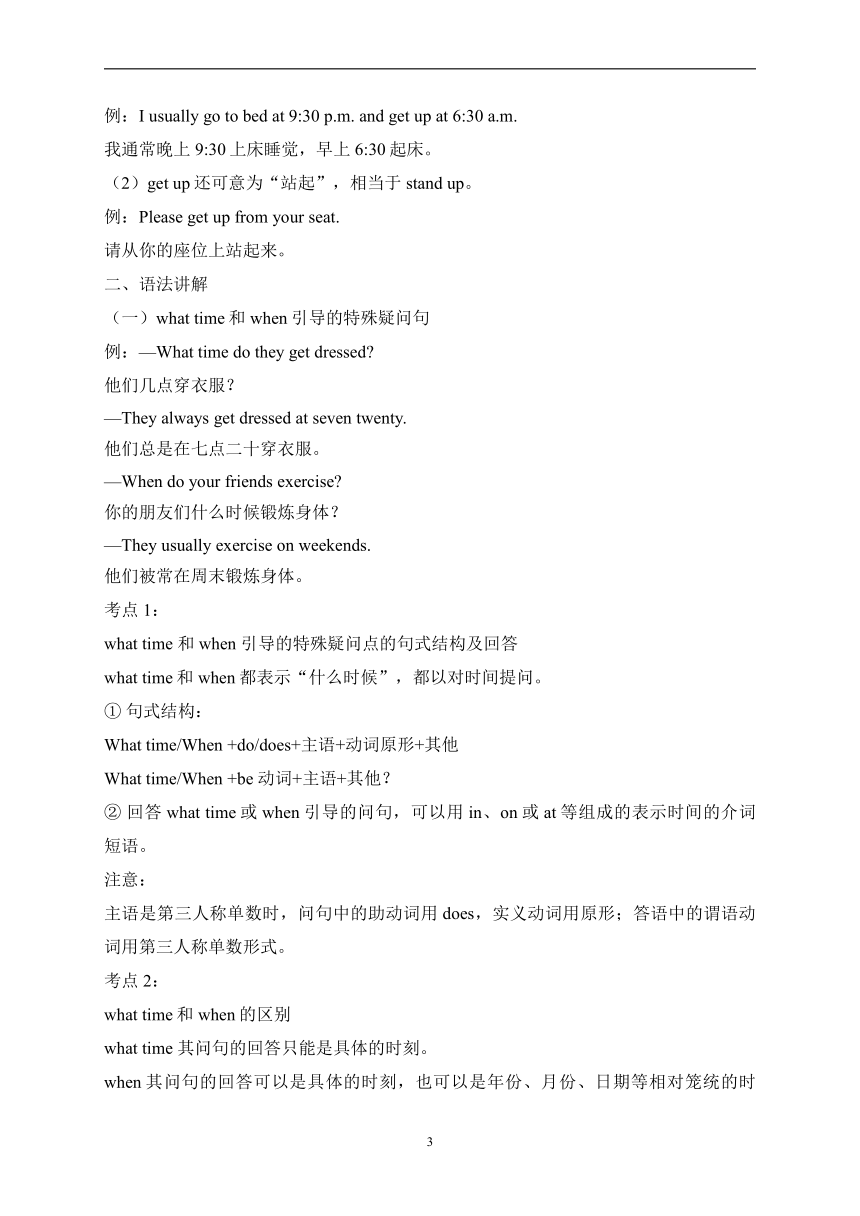
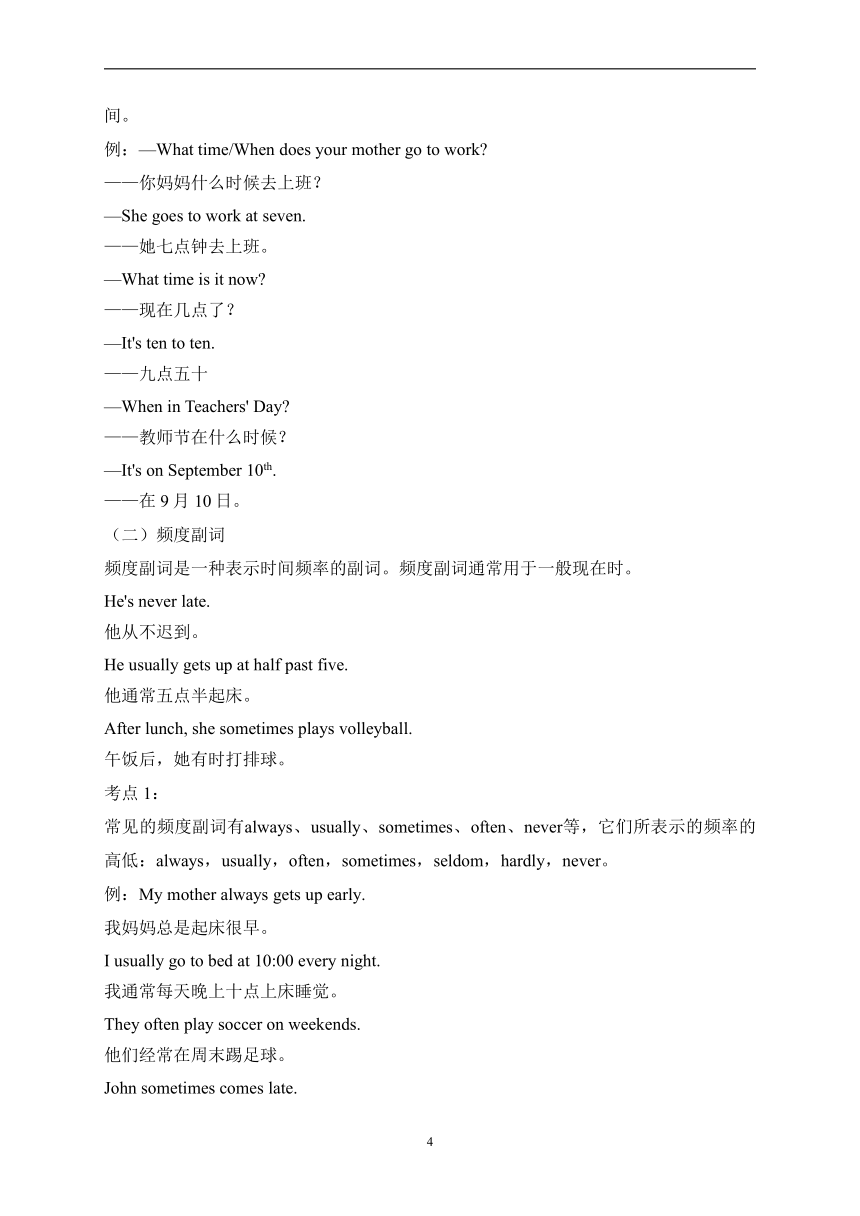
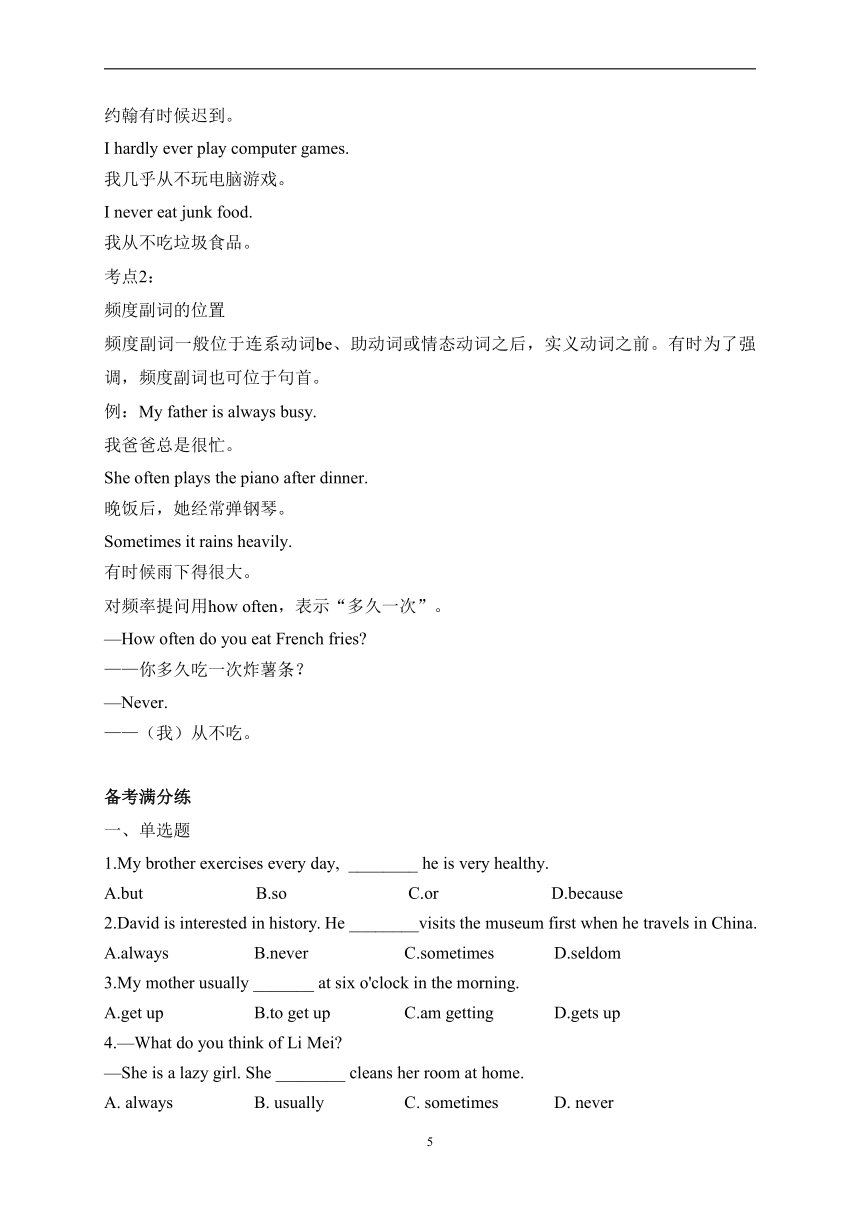
文档简介
Unit 2 What time do you go to school
重难点攻略
一、知识点讲解
1. dressed穿上衣服
(1)be dressed in + 衣服/颜色意为“穿着……”表示穿的状态。
例:My young brother is only two year old. He can't get dressed.
我的弟弟只有两岁,他不会穿衣服。
She is dressed in red.
她穿着红色的衣服。
(2)dress可作动词和名词,其用法如下:
① 动词:穿衣服,作及物动词和不及物动词均可。
dress sb./oneself给某人/自己穿衣服
② 名词:连衣裙,可数名词。
2. brush teeth 刷牙
brush. v. 刷;刷净;n. 刷子
(1)brush在此处作及物动词,意为“刷;刷净”,第三人称单数形式为brushes。
例:You should learn to brush your shoes.
你应该学着刷你的鞋。
(2)brush还可作可数名词,意为“刷子”,其复数形式为brushes。
例:I need some new brushes.
我需要几把新刷子
tooth n. 牙齿
(1)tooth作可数名词,其复数形式为teeth。
例:These meat-eating fish have sharp teeth.
这些食肉性鱼类有着锋利的牙齿。
(2)brush (one's) teeth意为“刷牙”,要用复数形式teeth表达,one's是形容词性物主代词或名词作有格。
例:Tum off the tap when you brush your teeth.
刷牙时关掉水龙头。
注意:
变复数时将oo变成ee的名词还有:fool→feet(脚);goose→geese(鹅)
3. take a shower 洗淋浴
洗淋浴也可用have a shower来表达。shower在此处作名词,意为“淋浴”
例:He like taking/having a hot shower in the morning.
他喜欢在早晨洗热水澡。
shower的其他含义:
(1)shower作名词,还有“阵雨;淋浴器(间)”的意思。
例:There will be some showers his afternoon.
今天下午会有阵雨。
I'd like to use the shower here.
我想用一下这里的淋浴器。
(2)shower也可作动词,意为“(洗)淋浴”。
例:I always shower after getting up.
起床后我总是洗个淋浴。
4. What time do you usually get up, Rick
里克,你通常几点起床?
(1)what time 什么时间
what time用来引导特殊疑问句,提问具体的时间。
例:What time does the breakfast start
早饭几点开始?
(2)usually 通常地;一般地
usually作频度副词,表示某事发生的频率,通常位于实义动词之前,助动词、情态动词或连系动词be之后,实义动词之前。
例:Mary usually goes to school at 7.
玛丽通常七点去上学。
I'm usually by so early.我通常都这么早。
位于连系动词be之后
(3)get up 起床;站起
① get up在此意为“起床”,其对应词组为go to bed上床睡觉。
例:I usually go to bed at 9:30 p.m. and get up at 6:30 a.m.
我通常晚上9:30上床睡觉,早上6:30起床。
(2)get up还可意为“站起”,相当于stand up。
例:Please get up from your seat.
请从你的座位上站起来。
二、语法讲解
(一)what time和when引导的特殊疑问句
例:—What time do they get dressed
他们几点穿衣服?
—They always get dressed at seven twenty.
他们总是在七点二十穿衣服。
—When do your friends exercise
你的朋友们什么时候锻炼身体?
—They usually exercise on weekends.
他们被常在周末锻炼身体。
考点1:
what time 和when 引导的特殊疑问点的句式结构及回答
what time和when都表示“什么时候”,都以对时间提问。
① 句式结构:
What time/When +do/does+主语+动词原形+其他
What time/When +be 动词+主语+其他?
② 回答what time或when引导的问句,可以用in、on或at等组成的表示时间的介词短语。
注意:
主语是第三人称单数时,问句中的助动词用does,实义动词用原形;答语中的谓语动词用第三人称单数形式。
考点2:
what time和when的区别
what time 其问句的回答只能是具体的时刻。
when其问句的回答可以是具体的时刻,也可以是年份、月份、日期等相对笼统的时间。
例:—What time/When does your mother go to work
——你妈妈什么时候去上班?
—She goes to work at seven.
——她七点钟去上班。
—What time is it now
——现在几点了?
—It's ten to ten.
——九点五十
—When in Teachers' Day
——教师节在什么时候?
—It's on September 10th.
——在9月10日。
(二)频度副词
频度副词是一种表示时间频率的副词。频度副词通常用于一般现在时。
He's never late.
他从不迟到。
He usually gets up at half past five.
他通常五点半起床。
After lunch, she sometimes plays volleyball.
午饭后,她有时打排球。
考点1:
常见的频度副词有always、usually、sometimes、often、never等,它们所表示的频率的高低:always,usually,often,sometimes,seldom,hardly,never。
例:My mother always gets up early.
我妈妈总是起床很早。
I usually go to bed at 10:00 every night.
我通常每天晚上十点上床睡觉。
They often play soccer on weekends.
他们经常在周末踢足球。
John sometimes comes late.
约翰有时候迟到。
I hardly ever play computer games.
我几乎从不玩电脑游戏。
I never eat junk food.
我从不吃垃圾食品。
考点2:
频度副词的位置
频度副词一般位于连系动词be、助动词或情态动词之后,实义动词之前。有时为了强调,频度副词也可位于句首。
例:My father is always busy.
我爸爸总是很忙。
She often plays the piano after dinner.
晚饭后,她经常弹钢琴。
Sometimes it rains heavily.
有时候雨下得很大。
对频率提问用how often,表示“多久一次”。
—How often do you eat French fries
——你多久吃一次炸薯条?
—Never.
——(我)从不吃。
备考满分练
一、单选题
1.My brother exercises every day, ________ he is very healthy.
A.but B.so C.or D.because
2.David is interested in history. He ________visits the museum first when he travels in China.
A.always B.never C.sometimes D.seldom
3.My mother usually _______ at six o'clock in the morning.
A.get up B.to get up C.am getting D.gets up
4.—What do you think of Li Mei
—She is a lazy girl. She ________ cleans her room at home.
A. always B. usually C. sometimes D. never
5.The students will have a party ________ the evening of May 5th.
A. on B. at C. in D. of
6.We have much _________ to do every day.
A. work B. job C. jobs D. works
7.Our Math teacher looks strong and he plays badminton very ________.
A.good B.nice C.best D.well
8.We should brush our _________ every day.
A. tooth B. teeth C. hand D. ear
9.—What do you often do after dinner
—I _________.
A. take shower B. take the shower C. takes showers D. take a shower
10.—What time is it now
—It's________.
A.at three o'clock B.at a quarter at three
C.a quarter to three D.forty-five past three
二、填空题
11.There are ______ (四十) students in my class.
12.He has a busy _____ (生活), but he is happy.
13.Our classroom is very dirty. Let's _____ (打扫) it up.
14.There are some children in the playground. _____ (一半) of them are boys.
15.We are in the same _____ (组) and we should help each other.
三、阅读理解
Whose house is this It's the Dawsons' new house in the village. The name of this village is Belmont. It's a little village near a big city. There are two small lakes in Belmont, and they live near one of them. They like it very much.
Mrs. Dawson is usually busy because she does her housework. She cooks the meals, cleans the house, washes the clothes, and she does the shopping for the family. Her daughter, Ann, helps her a little every day. Mr. Dawson sometimes helps his wife, too.
Many people are now moving from the cities to the village because it's usually quiet and people there are more friendly.
16.Who may be the busiest among the Dawsons
A.Mr. Dawson. B.Mrs. Dawson and her daughter.
C.Mrs. Dawson. D.Mr. Dawson and his daughter.
17.Where is Belmont
A.It's near a big city. B.It's near a big town.
C.It's far from the city. D.It's near the two lakes.
18.What can we know about Mr. Dawson
A.He often helps Mrs. Dawson. B.He helps Mrs. Dawson every day.
C.He never helps Mrs. Dawson. D.He sometimes helps Mrs. Dawson.
19.What does Mrs. Dawson usually do at home
a. Cooks the meals.
b. Cleans the house.
c. Washes the clothes.
d. Watches TV.
A.abcd B.acd C.abc D.bcd
20.Why are many people moving to the village
A.Because there are lakes near the village.
B.Because the village looks like the city.
C.Because it is like a little town.
D.Because it's usually quiet and people there are more friendly.
四、完形填空
In Western countries, many children do chores (做家务) to get pocket money. They usually start to do chores 21 10.
School students have to 22 and study for tests on weekdays. So 23 often do chores at weekends.
Young kids only do 24 chores. So they don’t get much money. But that's all right. Many of them only want to 25 candies. And candies are cheap! They help wash the dishes after dinner, and 26 the family cat or dog.
When kids get older they want to buy more and more things. They want things that are more expensive than 27 . Then they have to work harder! They often 28 the family car, cut the grass, walk the dog or cook dinner.
Doing chores is a good 29 for kids to learn new things. For example, they can learn how to use a lawn mower (割草机) or how to cook. Of course, their parents 30 them at first.
21.A.at the age of B.in front of C.at the end of D.in the centre of
22.A.wash clothes B.do their homework
C.listen to English D.play sports
23.A.she B.he C.it D.they
24.A.easy B.hard C.long D.heavy
25.A.find B.bring C.buy D.make
26.A.sell B.feed C.borrow D.catch
27.A.candies B.pets C.cars D.books
28.A.drive B.use C.take D.wash
29.A.subject B.way C.problem D.skill
30.A.hold B.pick C.help D.put
答案以及解析
一、单选题
1.答案:B
解析:考查连词的辨析。句意: 我哥哥每天锻炼, 所以他很健康。由句意可知两句之间存在因果关系, 且此处该连词连接的句子是结果。故选B。
2.答案:A
解析:句意:David对历史感兴趣。他来中国旅行时总是先参观博物馆。考查频率副词辨析。always总是;never从不;sometimes有时;seldom几乎不。根据"David is interested in history."可知此处应用"always",表示总是先参观博物馆。故选A。
3.答案:D
解析:句意:我妈妈通常在早上六点起床。考查一般现在时。本句时间状语为at six o'clock in the morning"每天早晨六点",用一般现在时,表示经常性、习惯性的动作,且主语是My mother"我的妈妈",是单数,动词用第三人称单数形式,用gets up。故选D。
4.答案:D
解析:A.always总是;B.usually通常;C.sometimes有时;D.never从不。根据"她是一个懒惰的女孩"可知"她从不打扫家里的房间"。故选D。
5.答案:A
解析:句意:学生们将在5月5日晚举办聚会。考查介词。on用于具体的某一天前;at用于具体的钟点前;in用于泛指的年、月、季节等前;of……的;根据"the evening of May 5th"可知,具体的一天的晚上用介词on。故选A。
6.答案:A
解析:job和work都有"工作"的意思,job是可数名词,work是不可数名词。空格前面的much修饰不可数名词。故选A。
7.答案:D
解析:句意:我们的数学老师看起来很强壮,他羽毛球打得很好。考查词义辨析。good好的;nice好的;best最好;well好地。play为动词,用副词修饰动词。故选D。
8.答案:B
解析:根据brush可排除C、D两项,表示"刷牙"应用brush teeth。故选B。
9.答案:D
解析:考查动词短语。根据固定搭配take a shower“沐浴”可知,应该是(晚饭后)我沐浴。故选D。
10.答案:C
解析:句意:—现在几点了?—现在是两点四十五分。考查时间的表达。at three o'clock在三点,不符合句意,回答时间用"It's+钟点",钟点前不加at,排除A、B选项;根据时间的表达方式,先说分钟再说时点,当分钟数小于等于30时,用past;当分钟数大于30时,用to;排除D选项。故选C。
二、填空题
11.答案:forty
12.答案:life
13.答案:clean
14.答案:Half
15.答案:group
三、阅读理解
16.答案:C
解析:细节理解题。根据"Mrs. Dawson is usually busy because she does her housework. She cooks the meals, cleans the house, washes the clothes, and she does the shopping for the family."可知,Dawson夫人是最忙的。故选C。
17.答案:A
解析:细节理解题。根据"The name of this village is Belmont. It's a little village near a big city."可知,Belmont是大城市附近的一个小村庄。故选A。
18.答案:D
解析:细节理解题。根据"Mr. Dawson sometimes helps his wife, too."可知,Dawson先生有时候也会帮助他太太。故选D。
19.答案:C
解析:细节理解题。根据"Mrs. Dawson is usually busy because she does her housework. She cooks the meals, cleans the house, washes the clothes, and she does the shopping for the family."可知,Dawson夫人通常在家做饭,打扫房子,洗衣服,为家人购物。故选C。
20.答案:D
解析:细节理解题。根据"Many people are now moving from the cities to the village because it's usually quiet and people there are more friendly."可知,因为那里通常很安静,那里的人更友好,所以很多人搬到村里。故选D。
四、完形填空
21.答案:A
解析:句意:他们通常在10岁开始做家务。at the age of在……岁时;in front of在……前面;at the end of在……结尾;in the centre of在……中央。根据"They usually start to do chores...10"可知是指在十岁的时候。故选A。
22.答案:B
解析:句意:学校的学生必须在工作日做作业和准备考试。wash clothes洗衣服;do their homework做作业;listen to English听英语;play sports做运动。根据"School students have to...and study for tests"可知是指在工作日做作业和准备考试。故选B。
23.答案:D
解析:句意:所以他们经常在周末做家务。she她;he他;it它;they他们。此空是代指students,应用they。故选D。
24.答案:A
解析:句意:小孩子只做简单的家务。easy容易的;hard困难的;long长的;heavy重的。根据"Young kids only do...chores. So they don’t get much money"可知小孩子只做一些简单的家务。故选A。
25.答案:C
解析:句意:他们中的许多人只想买糖果。find找到;bring带来;buy买;make制作。根据"Many of them only want to...candies. And candies are cheap"可知是指小孩子只想买糖果。故选C。
26.答案:B
解析:句意:他们在晚饭后帮忙洗碗,喂家里的猫或狗。sell卖;feed喂养;borrow借入;catch抓住。根据"They help wash the dishes after dinner, and...the family cat or dog."可知是指喂养家里的猫或狗。故选B。
27.答案:A
解析:句意:他们想要比糖果更贵的东西。candies糖果;pets宠物;cars汽车;books书本。根据"They want things that are more expensive than"以及上文提到小孩子做简单的家务是为了买糖果可知,此处是指比糖果更昂贵的东西。故选A。
28.答案:D
解析:句意:他们经常洗车,割草,遛狗或做饭。drive开车;use使用;take拿走;wash洗。根据"They often...the family car"可知是指洗车。故选D。
29.答案:B
解析:句意:做家务是孩子学习新事物的好方法。subject科目;way方式;problem问题;skill技能。根据"Doing chores is a good...for kids to learn new things."可知此处是指家务是孩子学习新事物的好方法。故选B。
30.答案:C
解析:句意:当然,他们的父母一开始会帮助他们。hold持有;pick摘;help帮助;put放置。根据"Of course, their parents...them at first."可知小孩子一开始做家务的时候,父母会帮助他们。故选C。
2
重难点攻略
一、知识点讲解
1. dressed穿上衣服
(1)be dressed in + 衣服/颜色意为“穿着……”表示穿的状态。
例:My young brother is only two year old. He can't get dressed.
我的弟弟只有两岁,他不会穿衣服。
She is dressed in red.
她穿着红色的衣服。
(2)dress可作动词和名词,其用法如下:
① 动词:穿衣服,作及物动词和不及物动词均可。
dress sb./oneself给某人/自己穿衣服
② 名词:连衣裙,可数名词。
2. brush teeth 刷牙
brush. v. 刷;刷净;n. 刷子
(1)brush在此处作及物动词,意为“刷;刷净”,第三人称单数形式为brushes。
例:You should learn to brush your shoes.
你应该学着刷你的鞋。
(2)brush还可作可数名词,意为“刷子”,其复数形式为brushes。
例:I need some new brushes.
我需要几把新刷子
tooth n. 牙齿
(1)tooth作可数名词,其复数形式为teeth。
例:These meat-eating fish have sharp teeth.
这些食肉性鱼类有着锋利的牙齿。
(2)brush (one's) teeth意为“刷牙”,要用复数形式teeth表达,one's是形容词性物主代词或名词作有格。
例:Tum off the tap when you brush your teeth.
刷牙时关掉水龙头。
注意:
变复数时将oo变成ee的名词还有:fool→feet(脚);goose→geese(鹅)
3. take a shower 洗淋浴
洗淋浴也可用have a shower来表达。shower在此处作名词,意为“淋浴”
例:He like taking/having a hot shower in the morning.
他喜欢在早晨洗热水澡。
shower的其他含义:
(1)shower作名词,还有“阵雨;淋浴器(间)”的意思。
例:There will be some showers his afternoon.
今天下午会有阵雨。
I'd like to use the shower here.
我想用一下这里的淋浴器。
(2)shower也可作动词,意为“(洗)淋浴”。
例:I always shower after getting up.
起床后我总是洗个淋浴。
4. What time do you usually get up, Rick
里克,你通常几点起床?
(1)what time 什么时间
what time用来引导特殊疑问句,提问具体的时间。
例:What time does the breakfast start
早饭几点开始?
(2)usually 通常地;一般地
usually作频度副词,表示某事发生的频率,通常位于实义动词之前,助动词、情态动词或连系动词be之后,实义动词之前。
例:Mary usually goes to school at 7.
玛丽通常七点去上学。
I'm usually by so early.我通常都这么早。
位于连系动词be之后
(3)get up 起床;站起
① get up在此意为“起床”,其对应词组为go to bed上床睡觉。
例:I usually go to bed at 9:30 p.m. and get up at 6:30 a.m.
我通常晚上9:30上床睡觉,早上6:30起床。
(2)get up还可意为“站起”,相当于stand up。
例:Please get up from your seat.
请从你的座位上站起来。
二、语法讲解
(一)what time和when引导的特殊疑问句
例:—What time do they get dressed
他们几点穿衣服?
—They always get dressed at seven twenty.
他们总是在七点二十穿衣服。
—When do your friends exercise
你的朋友们什么时候锻炼身体?
—They usually exercise on weekends.
他们被常在周末锻炼身体。
考点1:
what time 和when 引导的特殊疑问点的句式结构及回答
what time和when都表示“什么时候”,都以对时间提问。
① 句式结构:
What time/When +do/does+主语+动词原形+其他
What time/When +be 动词+主语+其他?
② 回答what time或when引导的问句,可以用in、on或at等组成的表示时间的介词短语。
注意:
主语是第三人称单数时,问句中的助动词用does,实义动词用原形;答语中的谓语动词用第三人称单数形式。
考点2:
what time和when的区别
what time 其问句的回答只能是具体的时刻。
when其问句的回答可以是具体的时刻,也可以是年份、月份、日期等相对笼统的时间。
例:—What time/When does your mother go to work
——你妈妈什么时候去上班?
—She goes to work at seven.
——她七点钟去上班。
—What time is it now
——现在几点了?
—It's ten to ten.
——九点五十
—When in Teachers' Day
——教师节在什么时候?
—It's on September 10th.
——在9月10日。
(二)频度副词
频度副词是一种表示时间频率的副词。频度副词通常用于一般现在时。
He's never late.
他从不迟到。
He usually gets up at half past five.
他通常五点半起床。
After lunch, she sometimes plays volleyball.
午饭后,她有时打排球。
考点1:
常见的频度副词有always、usually、sometimes、often、never等,它们所表示的频率的高低:always,usually,often,sometimes,seldom,hardly,never。
例:My mother always gets up early.
我妈妈总是起床很早。
I usually go to bed at 10:00 every night.
我通常每天晚上十点上床睡觉。
They often play soccer on weekends.
他们经常在周末踢足球。
John sometimes comes late.
约翰有时候迟到。
I hardly ever play computer games.
我几乎从不玩电脑游戏。
I never eat junk food.
我从不吃垃圾食品。
考点2:
频度副词的位置
频度副词一般位于连系动词be、助动词或情态动词之后,实义动词之前。有时为了强调,频度副词也可位于句首。
例:My father is always busy.
我爸爸总是很忙。
She often plays the piano after dinner.
晚饭后,她经常弹钢琴。
Sometimes it rains heavily.
有时候雨下得很大。
对频率提问用how often,表示“多久一次”。
—How often do you eat French fries
——你多久吃一次炸薯条?
—Never.
——(我)从不吃。
备考满分练
一、单选题
1.My brother exercises every day, ________ he is very healthy.
A.but B.so C.or D.because
2.David is interested in history. He ________visits the museum first when he travels in China.
A.always B.never C.sometimes D.seldom
3.My mother usually _______ at six o'clock in the morning.
A.get up B.to get up C.am getting D.gets up
4.—What do you think of Li Mei
—She is a lazy girl. She ________ cleans her room at home.
A. always B. usually C. sometimes D. never
5.The students will have a party ________ the evening of May 5th.
A. on B. at C. in D. of
6.We have much _________ to do every day.
A. work B. job C. jobs D. works
7.Our Math teacher looks strong and he plays badminton very ________.
A.good B.nice C.best D.well
8.We should brush our _________ every day.
A. tooth B. teeth C. hand D. ear
9.—What do you often do after dinner
—I _________.
A. take shower B. take the shower C. takes showers D. take a shower
10.—What time is it now
—It's________.
A.at three o'clock B.at a quarter at three
C.a quarter to three D.forty-five past three
二、填空题
11.There are ______ (四十) students in my class.
12.He has a busy _____ (生活), but he is happy.
13.Our classroom is very dirty. Let's _____ (打扫) it up.
14.There are some children in the playground. _____ (一半) of them are boys.
15.We are in the same _____ (组) and we should help each other.
三、阅读理解
Whose house is this It's the Dawsons' new house in the village. The name of this village is Belmont. It's a little village near a big city. There are two small lakes in Belmont, and they live near one of them. They like it very much.
Mrs. Dawson is usually busy because she does her housework. She cooks the meals, cleans the house, washes the clothes, and she does the shopping for the family. Her daughter, Ann, helps her a little every day. Mr. Dawson sometimes helps his wife, too.
Many people are now moving from the cities to the village because it's usually quiet and people there are more friendly.
16.Who may be the busiest among the Dawsons
A.Mr. Dawson. B.Mrs. Dawson and her daughter.
C.Mrs. Dawson. D.Mr. Dawson and his daughter.
17.Where is Belmont
A.It's near a big city. B.It's near a big town.
C.It's far from the city. D.It's near the two lakes.
18.What can we know about Mr. Dawson
A.He often helps Mrs. Dawson. B.He helps Mrs. Dawson every day.
C.He never helps Mrs. Dawson. D.He sometimes helps Mrs. Dawson.
19.What does Mrs. Dawson usually do at home
a. Cooks the meals.
b. Cleans the house.
c. Washes the clothes.
d. Watches TV.
A.abcd B.acd C.abc D.bcd
20.Why are many people moving to the village
A.Because there are lakes near the village.
B.Because the village looks like the city.
C.Because it is like a little town.
D.Because it's usually quiet and people there are more friendly.
四、完形填空
In Western countries, many children do chores (做家务) to get pocket money. They usually start to do chores 21 10.
School students have to 22 and study for tests on weekdays. So 23 often do chores at weekends.
Young kids only do 24 chores. So they don’t get much money. But that's all right. Many of them only want to 25 candies. And candies are cheap! They help wash the dishes after dinner, and 26 the family cat or dog.
When kids get older they want to buy more and more things. They want things that are more expensive than 27 . Then they have to work harder! They often 28 the family car, cut the grass, walk the dog or cook dinner.
Doing chores is a good 29 for kids to learn new things. For example, they can learn how to use a lawn mower (割草机) or how to cook. Of course, their parents 30 them at first.
21.A.at the age of B.in front of C.at the end of D.in the centre of
22.A.wash clothes B.do their homework
C.listen to English D.play sports
23.A.she B.he C.it D.they
24.A.easy B.hard C.long D.heavy
25.A.find B.bring C.buy D.make
26.A.sell B.feed C.borrow D.catch
27.A.candies B.pets C.cars D.books
28.A.drive B.use C.take D.wash
29.A.subject B.way C.problem D.skill
30.A.hold B.pick C.help D.put
答案以及解析
一、单选题
1.答案:B
解析:考查连词的辨析。句意: 我哥哥每天锻炼, 所以他很健康。由句意可知两句之间存在因果关系, 且此处该连词连接的句子是结果。故选B。
2.答案:A
解析:句意:David对历史感兴趣。他来中国旅行时总是先参观博物馆。考查频率副词辨析。always总是;never从不;sometimes有时;seldom几乎不。根据"David is interested in history."可知此处应用"always",表示总是先参观博物馆。故选A。
3.答案:D
解析:句意:我妈妈通常在早上六点起床。考查一般现在时。本句时间状语为at six o'clock in the morning"每天早晨六点",用一般现在时,表示经常性、习惯性的动作,且主语是My mother"我的妈妈",是单数,动词用第三人称单数形式,用gets up。故选D。
4.答案:D
解析:A.always总是;B.usually通常;C.sometimes有时;D.never从不。根据"她是一个懒惰的女孩"可知"她从不打扫家里的房间"。故选D。
5.答案:A
解析:句意:学生们将在5月5日晚举办聚会。考查介词。on用于具体的某一天前;at用于具体的钟点前;in用于泛指的年、月、季节等前;of……的;根据"the evening of May 5th"可知,具体的一天的晚上用介词on。故选A。
6.答案:A
解析:job和work都有"工作"的意思,job是可数名词,work是不可数名词。空格前面的much修饰不可数名词。故选A。
7.答案:D
解析:句意:我们的数学老师看起来很强壮,他羽毛球打得很好。考查词义辨析。good好的;nice好的;best最好;well好地。play为动词,用副词修饰动词。故选D。
8.答案:B
解析:根据brush可排除C、D两项,表示"刷牙"应用brush teeth。故选B。
9.答案:D
解析:考查动词短语。根据固定搭配take a shower“沐浴”可知,应该是(晚饭后)我沐浴。故选D。
10.答案:C
解析:句意:—现在几点了?—现在是两点四十五分。考查时间的表达。at three o'clock在三点,不符合句意,回答时间用"It's+钟点",钟点前不加at,排除A、B选项;根据时间的表达方式,先说分钟再说时点,当分钟数小于等于30时,用past;当分钟数大于30时,用to;排除D选项。故选C。
二、填空题
11.答案:forty
12.答案:life
13.答案:clean
14.答案:Half
15.答案:group
三、阅读理解
16.答案:C
解析:细节理解题。根据"Mrs. Dawson is usually busy because she does her housework. She cooks the meals, cleans the house, washes the clothes, and she does the shopping for the family."可知,Dawson夫人是最忙的。故选C。
17.答案:A
解析:细节理解题。根据"The name of this village is Belmont. It's a little village near a big city."可知,Belmont是大城市附近的一个小村庄。故选A。
18.答案:D
解析:细节理解题。根据"Mr. Dawson sometimes helps his wife, too."可知,Dawson先生有时候也会帮助他太太。故选D。
19.答案:C
解析:细节理解题。根据"Mrs. Dawson is usually busy because she does her housework. She cooks the meals, cleans the house, washes the clothes, and she does the shopping for the family."可知,Dawson夫人通常在家做饭,打扫房子,洗衣服,为家人购物。故选C。
20.答案:D
解析:细节理解题。根据"Many people are now moving from the cities to the village because it's usually quiet and people there are more friendly."可知,因为那里通常很安静,那里的人更友好,所以很多人搬到村里。故选D。
四、完形填空
21.答案:A
解析:句意:他们通常在10岁开始做家务。at the age of在……岁时;in front of在……前面;at the end of在……结尾;in the centre of在……中央。根据"They usually start to do chores...10"可知是指在十岁的时候。故选A。
22.答案:B
解析:句意:学校的学生必须在工作日做作业和准备考试。wash clothes洗衣服;do their homework做作业;listen to English听英语;play sports做运动。根据"School students have to...and study for tests"可知是指在工作日做作业和准备考试。故选B。
23.答案:D
解析:句意:所以他们经常在周末做家务。she她;he他;it它;they他们。此空是代指students,应用they。故选D。
24.答案:A
解析:句意:小孩子只做简单的家务。easy容易的;hard困难的;long长的;heavy重的。根据"Young kids only do...chores. So they don’t get much money"可知小孩子只做一些简单的家务。故选A。
25.答案:C
解析:句意:他们中的许多人只想买糖果。find找到;bring带来;buy买;make制作。根据"Many of them only want to...candies. And candies are cheap"可知是指小孩子只想买糖果。故选C。
26.答案:B
解析:句意:他们在晚饭后帮忙洗碗,喂家里的猫或狗。sell卖;feed喂养;borrow借入;catch抓住。根据"They help wash the dishes after dinner, and...the family cat or dog."可知是指喂养家里的猫或狗。故选B。
27.答案:A
解析:句意:他们想要比糖果更贵的东西。candies糖果;pets宠物;cars汽车;books书本。根据"They want things that are more expensive than"以及上文提到小孩子做简单的家务是为了买糖果可知,此处是指比糖果更昂贵的东西。故选A。
28.答案:D
解析:句意:他们经常洗车,割草,遛狗或做饭。drive开车;use使用;take拿走;wash洗。根据"They often...the family car"可知是指洗车。故选D。
29.答案:B
解析:句意:做家务是孩子学习新事物的好方法。subject科目;way方式;problem问题;skill技能。根据"Doing chores is a good...for kids to learn new things."可知此处是指家务是孩子学习新事物的好方法。故选B。
30.答案:C
解析:句意:当然,他们的父母一开始会帮助他们。hold持有;pick摘;help帮助;put放置。根据"Of course, their parents...them at first."可知小孩子一开始做家务的时候,父母会帮助他们。故选C。
2
同课章节目录
